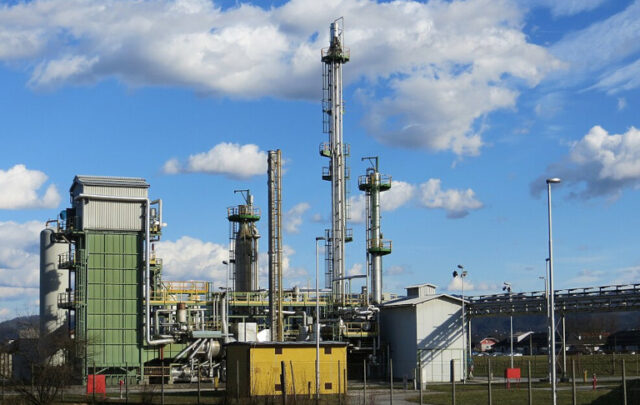Click on the headline (link) for the full text.
Many more articles are available through the Energy Bulletin homepage
Oil Sector’s Problem In Replacing Oil Reserves Could Worsen
Isabel Ordonez, Dow Jones via CNN Money
Chevron Corp.’s (CVX) dramatically low 2007 reserve replacement announced last Friday may be the first in a series of disappointing results reported by major oil companies in the coming weeks.
Chevron announced Friday that it replaced just 10% to 15% of its reserves in 2007, a rate lower than the already pessimistic 50% to 60% analysts estimated. And although Chevron’s report is expected to be the weakest among the oil giants, analysts also expect ConocoPhillips (COP), Exxon Mobil Corp. (XOM), and Royal Dutch Shell PLC (RDSA) to report reserves replacement shy of 100%. BP PLC (BP), which reported 120% reserve replacement on Tuesday, has so far bucked the trend.
Although Wall Street has shown more tolerance towards weak reserve replacement in recent years, in part due to the industry’s strong financial position, some analysts are losing patience with the under-performance. Reserves replacement remains a key benchmark that informs whether a company is replenishing its assets as it produces oil and gas.
(7 February 2008)
Big picture Russia: Oil production & taxes (opinion)
Chris Weafer, Prime-Tass (Russia)
… There is no doubt that Russia’s oil majors are facing a difficult environment due to taxes, costs and the fact that the state is prioritizing downstream ahead of upstream growth.
… -Main Points about Russian oil
Russia’s oil companies are in a tough production environment because of the state’s high tax take and fast growth in their cost base. That fact has again been highlighted, although it is not directly associated with Rosneft’s disclosure that the rate of decline at Sakhalin-1 will be much worse than previously estimated. The issue highlights the problems in the industry that justify the current relatively low valuations and the continuing underperformance of the oil sector against the overall market and international peers.
… Growth in Russia’s average daily oil production may be only, at best, 0.5% in 2008, and we could even see negative growth for the first time since 1998. This is because of the production problems at Sakhalin-1, one of the few projects that has been delivering rising output, and the low rate of upstream investment spending due to the high tax regime and rising cost base for Russia’s upstream oil majors. The more attractive tax regime in downstream oil also means that the oil companies have been switching investment into refining operations.
The state has deliberately engineered near-stagnant production growth as part of a strategy to switch cash out of extractive industries and into the broader economy via the federal budget. The 80% windfall tax is a major part of that strategy, as are deliberate delays in allocating new oil deposits for development.
… Russia’s export capacity is already under threat because of both increasing domestic demand for oil products as the economy expands and because of the deliberate switch to downstream as the government looks to move up the value chain across all extractive industries. The plan to diversify away from raw material export vulnerability with a better mix of value-added products manufactured domestically is a key part of the first phase of the government’s plan to create a more diversified economy. Because of that combination, it is estimated that within four or five years, i.e. before any significant new production volume could become available, Russia’s crude export volumes may drop from the current 5.4 mln bpd to about 4.5 mln bpd. Note that oil product exports add an additional 2.0 mln bbl on average each day.
(7 February 2008)
Evidence of the validity of Jeffrey Brown’s Export Land Model (ELM). See A quantitative assessment of future net oil exports by the top five net oil exporters
Energy: The $22 trillion question
Steve Hargreaves, CNNMoney
How safe are our oil supplies? Where will the new supplies come from? Have high oil prices killed the economy? Are speculative investors responsible for the price runup?
These are all central – an contentious – questions in the world of oil. And they’re all up for debate as leading members of the oil and energy industry gather in Houston, Texas for Cambridge Energy Research Associates’ (CERA) annual energy conference.
…Yergin said to look for larger issues involving energy infrastructure and whether it’s adequate to meet the world’s growing demand.
The need to address this issue was made especially clear when hurricanes Rita and Katrina knocked out a significant chunk of the country’s oil and gas production in 2005, and transmission failures caused a widespread electricity blackout in the Northeast in 2003.
Yergin said the world needs to invest $22 trillion – roughly 50% more than the entire annual economic output of the U.S. – in energy alone over the next 25 years to meet its growing needs. That number, he said, provides the backdrop to this whole discussion
(8 February 2008)
Contributor Steven Lesh writes:
It would make an interesting article for someone to calculate the energy security opportunity cost – with all respect for the dead and dismembered – of the Iraq war. Seat of the pants: If the US uses 25% of the world’s energy and the war will cost $2 trillion, we could already be 40% of the way there.
Nero fiddles while the economy grinds to a halt.
The Second Great Depression
Kenneth S. Deffeyes, Beyond Oil
We are now entering the Second Great Depression. The name isn’t original with me – I picked it up off the Internet – but it seems to fit the situation. My interpretation is that world oil production will diminish faster than we can bring on alternatives.
I was ready to vote for Senator Obama, but out of desperation. For the last two years, I have been saying that we need a charismatic leader; another Franklin Roosevelt, another Winston Churchill, or another John Kennedy. (I decided that those WC signs in England were public memorials for Winston Churchill.) Of course, I am not sure that Barack Obama is destined to be a great leader, but I have the feeling that none of the other presidential candidates could make us feel better while we suffer.
In the oil news, the peak has happened.
* The US Energy Information Agency www.eia.doe.gov/ipm/t11d.xls (MS Excel spreadsheet) has May 2005 as the peak. My estimate for December 2005 was a casualty of Hurricane Katrina, but notice that the winning month moved back in time, not forward.
* Oil & Gas Journal reports that world oil production in 2007 was lower than 2006. Somehow, O&GJ scratched together enough 2006 oil to avoid placing the peak in 2005. Even now, the O&GJ web site reports the 2007 oil production drop in a single sentence, without explanation.
(6 February 2008)
Science 1101 Part 2: Oil as a Liquid Fuel
Gail Tverberg, The Oil Drum
This is Part 2 of my rewrite of my earlier post relating to curriculum for a science peak oil course. The earlier version can be found here. Part 1 can be found here.
Part 2 has been substantially rewritten. One theme is energy, and why energy is important to our standard of living. I try to compare the energy in oil to the energy in food. To make the comparison more understandable, I convert energy to kilocalories, since most people are familiar with calories in food. I also point out the errors of economists, both in the text and in the discussion questions at the end.
Another theme is the special characteristics of oil, and why oil is valued as a liquid fuel. I think we are sometimes kind of fuzzy in our thinking about substitutes for liquid fuel. We don’t think about our built infrastructure, and just assume electricity can be substituted for oil when it really is at best a very long-term alternative. I discuss various alternatives including battery-operated cars, hydrogen, and conservation. The two sections relating to corn ethanol could probably be a post of their own.
I also talk about the impact of oil on prices. I make the point that big increases in petroleum prices are likely, with only a small shortage of oil. I also point our that food prices are likely to increase, partly because of the use of petroleum for food production, and partly because corn for ethanol competes with food for land use.
I made a small change to the section on actions young people can take. I also added some discussion questions at the end.
(8 February 2008)
Keeping the oil flowing
The World Next Week, Oxford Analytica
Concerns about energy supplies have dominated newspaper headlines since the Russian-Ukrainian gas crisis of 2005. Yet are these concerns legitimate?
‘Peak oil’ theory
Physical scarcity of hydrocarbons is not an issue, despite Jeremiahs who forecast a point in time at which the maximum global petroleum production rate is reached, after which the rate of production enters its terminal decline. The ‘peak oil’ theory should not stick: new reserves are being discovered around the world on a regular basis. The bringing on stream this week of Iran’s vast Azadegan field — estimated to have some 26 billion barrels of oil — and expansive, still largely untouched provinces in Russia, such as Yamal and East Siberia, show that the Earth is far from running on empty.
…Most, if not all, governments of energy-rich states have either already established or are seeking to establish control over their country’s natural resources, which they — very fairly — see as part of their sovereignty and, at a time of record high prices, a means to development. These producer states fear ‘consumer cartels’ almost as much as consumer states fret over a possible disruption of supply.
They may drive a hard bargain, but they also need and depend on consumers, like any storekeeper or market seller.
(9-15 February 2008)
A surprising piece to be published by prominent experts:
Oxford Analytica is an international, independent consulting firm drawing on a network of over 1,000 senior faculty members at Oxford and other major universities and research institutions around the world.
Related: Dow Jones just ran a piece Oil Sector’s Problem In Replacing Oil Reserves Could Worsen. -BA
Sheryl Crow’s Apocalyptic Peak Oil Song
Kerry Trueman, Blog
“Gasoline,” from Sheryl Crow’s just-released Album “Detours,” is set in 2017, and foresees a nightmarish future when the world runs out of gas:
It was the summer of the riots
And London sat in sweltering heat
And the gangs of Mini Coopers
Took the battle to the streets
But when the creed was handed down
For no more trucks and no more cars
They threw cans of petrol through the windows at Scotland Yard…
…When the Mounties stormed the palace of the Saudi family
They held them up for ransom
Without disturbing their high tea
But their getaway was shaky
They stalled in the Riyadh streets
Cause you can’t make it very far
When your tank is on empty
Crow’s song sends the message that we’ve built our whole way of life on a shaky foundation that’s bound to crack when we run out of gas. Towards the end of “Gasoline,” she sings: I’ve got a message and a megaphone, and I’ll scream it to the death…”
Will a post-petroleum scenario set to music get more Americans reflecting on the fact that there’s only so much oil in the ground? No doubt someone, somewhere, right now, is sitting in their car, stuck in traffic, grooving to the strains of “Gasoline.” I hope it sinks in, and makes a stain.
To learn more about peak oil visit theoildrum.com
(6 February 2008)
Links and YouTube at of Crow at original.





